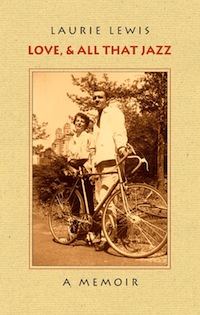Love, & All That Jazz
By Laurie Lewis
Published by The Porcupine’s Quill
222 pages, $22.95
Reviewed by Jenny Boychuk
How long are we supposed to wait for the ones we love? What happens when the years you’ve been apart equal how long you were together? And when that number doubles?
Laurie Lewis’ memoir reminds us that, while we may use time to measure many things, it is not always an accurate way to measure love—if love can even be measured at all. Lewis published her first book, Little Comrades (also a memoir), at the age of 81. Love, & All That Jazz acts as a sequel. She talks about discovering her love of writing late in life on her website:
“When you’ve lived a long time, as I have, it’s possible that you’ve had not just one life but several.”
Lewis begins her new memoir in 1950s New York City. She is in her early twenties and married to Sol, a “smart, honorable, kind” man, with whom she lives a content life; that is, until the day she walks past Gary Lewis, a jazz musician and future photographer for Pepsi-Cola, on the second floor of her apartment building. Neither can ignore the immediate attraction they feel for each other.
It is summer when Lewis begins to see Gary, who is also married, in secret. They meet at bus stops, go for breakfast, and, eventually, Lewis finds herself in his apartment. A few weeks before Christmas, she leaves a note for Sol and sets off to begin her new life with Gary. Living in a tiny, cold studio apartment in Manhattan with hardly any furniture and little money, they are both happier than they could have imagined. Within the next year, they are married and their daughter Amanda is born.
But while the first years are happy, things soon begin to turn and Lewis, who is heartbreakingly innocent and naïve, tries to support her husband through his drug addictions, alcoholism and mental illness. He cheats on her. He lies. He abuses. But still, her love sees him through every recovery, every relapse. Even when he stands before her as a stranger, she manages to see the man she fell in love with on the staircase.
Her compassion is evident even many years later, as she recounts how those years passed:
“Gary’s periods of serious illness run together in my mind. How hard to write about this, to sort out the memories, to make decisions about how much honesty, where, and when. I see things now so differently.”
Lewis aptly describes the ‘50s and ‘60s NYC art scene with vibrancy and detail; she takes her readers into a time when Andy Warhol was “a talented and relatively unknown illustrator,” Ginsburg and Kerouac were reading in local bars, and Ray Charles was playing in California clubs.
“There was Ray with his piano, the musicians grouped at the side rather formally, and the Raelettes in front of the band, the stage only slightly raised. Ray was perspiring and Gary thought he needed something to wipe his brow, so he passed him a silk handkerchief. … The Raelettes swaying, vocal backup, all the love and energy in the room. Gary’s photographs of them were more soulful than the ones for Pepsi-Cola World, certainly. This was his spiritual home.”
Eventually, strong-willed and independent Lewis steps outside of her relationship and builds a life for herself and Amanda in Ontario. She becomes a single working mother in a time when daycare doesn’t exist, and the space she gives her marriage will last far longer than the seven years she and Gary were together. Lewis questions what it means to build a life, and what happens when you are living a kind of life you didn’t intend to. Are there people we are meant to be with no matter what? And why do we keep coming back to them?
Lewis’ prose is an easy kind of beauty, and the story reads as if she sat down and typed it out within a single afternoon. She is humble, honest and likeable, which makes it difficult not to care about her story and her life. Even the ending lends itself to the book’s humanness and honesty; it is strangely satisfying: “But I have to get to the end of this book. Have to finish it now, because I’m sick of writing about the past. I’d like to wake up tomorrow and exist in the day that is, whatever it is.”
I think the best books are ones that manage to both end and begin on the last page.
Jenny Boychuk lives, reads and writes in Sorrento, B.C.

{ 0 comments… add one now }